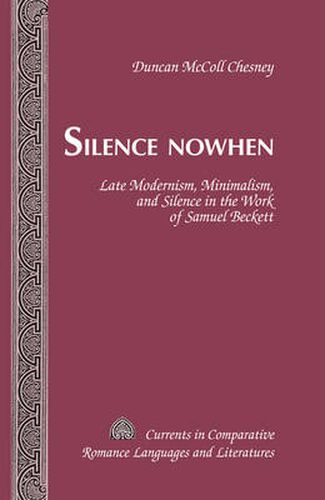Readings Newsletter
Become a Readings Member to make your shopping experience even easier.
Sign in or sign up for free!
You’re not far away from qualifying for FREE standard shipping within Australia
You’ve qualified for FREE standard shipping within Australia
The cart is loading…






This title is printed to order. This book may have been self-published. If so, we cannot guarantee the quality of the content. In the main most books will have gone through the editing process however some may not. We therefore suggest that you be aware of this before ordering this book. If in doubt check either the author or publisher’s details as we are unable to accept any returns unless they are faulty. Please contact us if you have any questions.
The dramatic and prose works of Samuel Beckett have long been understood as central to twentieth-century literature and particularly to questions about aesthetics, ethics, and the modernism-postmodernism distinction. Duncan McColl Chesney addresses many of the main issues in Beckett criticism by focusing on a key aspect of Beckett’s work throughout his long career: silence. Chesney links Beckett’s language and silence back to his predecessors, especially Joyce and Proust - laterally to contemporary movements of minimalism in the sister arts and theoretically in in-depth discussions of Blanchot and Adorno. By doing so, Chesney addresses how Beckett’s works remain true, to the end, to a minimalist impulse that is essentially modernist or late modernist without giving over to the rising dominant of postmodernism. Chesney delineates a sigetics - a discourse of silence whose main strategies in Beckett are reticence and ellipsis - and through studies of Godot, Endgame, Krapp’s Last Tape, Happy Days, the Trilogy, Company, and other works, teases out of Beckett’s minimal aesthetics a Beckettian minimal ethics. In brief glimmers in his texts Beckett provides proleptic hints at reconciliation and the possibility of ethical life that are neither theological nor mystical, but that minimally hold to an alternate rationality from that of the reified world of exchange and catastrophe.
$9.00 standard shipping within Australia
FREE standard shipping within Australia for orders over $100.00
Express & International shipping calculated at checkout
This title is printed to order. This book may have been self-published. If so, we cannot guarantee the quality of the content. In the main most books will have gone through the editing process however some may not. We therefore suggest that you be aware of this before ordering this book. If in doubt check either the author or publisher’s details as we are unable to accept any returns unless they are faulty. Please contact us if you have any questions.
The dramatic and prose works of Samuel Beckett have long been understood as central to twentieth-century literature and particularly to questions about aesthetics, ethics, and the modernism-postmodernism distinction. Duncan McColl Chesney addresses many of the main issues in Beckett criticism by focusing on a key aspect of Beckett’s work throughout his long career: silence. Chesney links Beckett’s language and silence back to his predecessors, especially Joyce and Proust - laterally to contemporary movements of minimalism in the sister arts and theoretically in in-depth discussions of Blanchot and Adorno. By doing so, Chesney addresses how Beckett’s works remain true, to the end, to a minimalist impulse that is essentially modernist or late modernist without giving over to the rising dominant of postmodernism. Chesney delineates a sigetics - a discourse of silence whose main strategies in Beckett are reticence and ellipsis - and through studies of Godot, Endgame, Krapp’s Last Tape, Happy Days, the Trilogy, Company, and other works, teases out of Beckett’s minimal aesthetics a Beckettian minimal ethics. In brief glimmers in his texts Beckett provides proleptic hints at reconciliation and the possibility of ethical life that are neither theological nor mystical, but that minimally hold to an alternate rationality from that of the reified world of exchange and catastrophe.